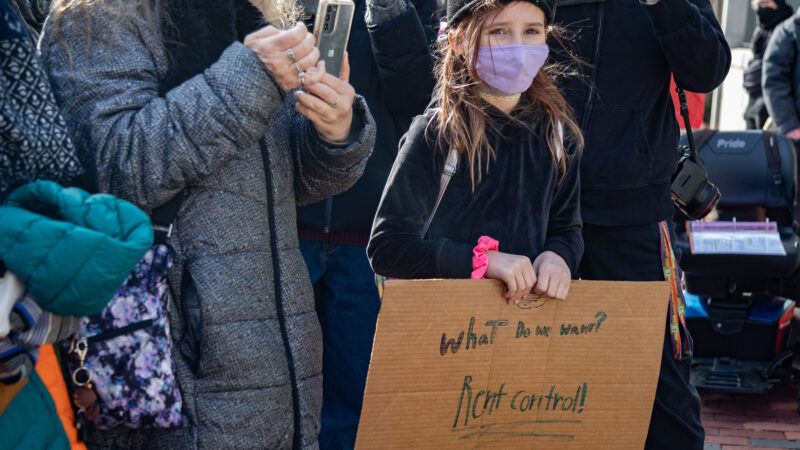The One-Way Rent Control Ratchet
The allegedly smart balance "anti-rent gouging" policies have struck between supply and stability is already unraveling.

When California's rent-control law was working its way through the Legislature in 2019, its author, Assemblyman David Chiu (D–San Francisco), said the policy was a necessary means of stopping the state's most egregious rent hikes.
"We have millions of Californians who are one rent increase away from eviction and homelessness, folks who are struggling on the streets because they were subject to 10, 20, 100 percent rent increases," he told journalists Liam Dillon and Matt Levin on their Gimme Shelter podcast.
Chiu argued his "anti-rent gouging" bill—which capped rent increases at the lesser of 5 percent plus inflation or 10 percent for most housing more than 15 years old—struck "the right balance between protecting tenants from egregious rent increases while providing landlords with the ability to make a fair rate of return."
By addressing the immediate issue, Chiu said the state would have some breathing room to build the homes it needs to fix its housing emergency in the long term.
Fast forward four years, home construction rates have been basically stagnant in California, rents and home prices are up, and lawmakers are calling for tighter rent controls to fix the immediate housing crisis.
Earlier this month, state Sen. Maria Elena Durazo (D–Los Angeles) announced her intent to introduce S.B. 567, a bill that would lower the rent caps established in Chiu's bill to inflation or 5 percent, whichever is less, according to the Sacramento Bee.
"We need to prevent homelessness, prevent people from being kicked out on the streets," Durazo said. "That's our goal with SB 567. This is an urgent humanitarian crisis in our communities."
The existing 10 percent cap was allegedly the thoughtful, measured means of doing this. Now it appears that 5 percent caps are now necessary to get the job done.
Rent control is making something of a comeback in the United States as housing costs mount in even once-affordable parts of the country.
Proponents argue the flaws of old-school rent control policies from mid-century or the 1970s can be designed away with smart "rent stabilization" or "anti-rent gouging" laws that have more generous rent caps, make allowances for inflation, and include rolling exemptions for recent construction.
State-level rent control policies passed in Oregon and California in 2019 were supposed to be the models of rent control done right.
Folks like Chiu argued that these laws wouldn't solve every problem, but they would address the most serious and destabilizing rent increases facing tenants.
But by not solving every problem, they've also left plenty of political will to push tougher rent control policies and made doing so a lot less of a political lift.
The allegedly fine balance Rent Control 2.0 proponents have struck between stability and supply, it turns out, isn't particularly politically stable.
If you've already won the argument that it's the government's role to prevent people from having to move because of rent increases, how high those increases can be seems almost irrelevant.
Some people will still be displaced by rising rents. Is it really any fairer that someone has to move because of a 5 percent rent increase as opposed to a 10 percent increase? People forced to move because of the lower rent increase are arguably more vulnerable and in need of protection. The argument for a stricter rent control regime makes itself.
It's a truism too that it's easier to tighten an existing policy than implement a new one. It's the difference between substituting one line of code for another versus passing a whole new policy all by itself.
Where rent control policies do exist in the U.S., the movement has been to make them more binding.
New York legislators made the longstanding rent stabilization law covering the New York City area more binding in 2019. Now, the state's progressive and socialist lawmakers are back again with a "good cause eviction" bill that would allow tenants to challenge literally any rent increase.
Portland, Maine, voters passed rent control in 2020 and then tightened it in 2022.
The same thing happened in Santa Monica, California, where this past election voters set a new allowable rent increase of $19 a month through the end of August 2023. Allowable rent hikes will then increase to $70.
The intellectual rehabilitation of rent control is raising the policy from the dead in the few places that did manage to get rid of the policy. Massachusetts voters overturned local rent control laws in the 1990s. Now, Boston's current mayor wants to bring them back.
The one serious, recent counterexample of rent control laws getting looser over time is St. Paul, Minnesota. There, voters passed a 3 percent cap on rent increases, no ifs, ands, or buts. This has since been weakened by the City Council but only after new construction activity immediately plunged.
I've argued before that I think even moderate rent control policies are ill-advised on policy and ideological grounds.
It's increasingly clear they're politically ill-advised as well. "Smart" rent control policies give way to less thoughtful ones quite easily.
Rent Free is a weekly newsletter from Christian Britschgi on urbanism and the fight for less regulation, more housing, more property rights, and more freedom in America's cities.


Show Comments (12)